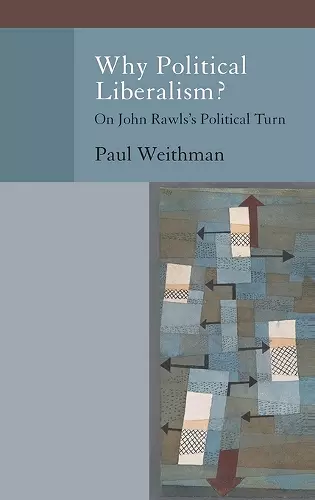Why Political Liberalism?
On John Rawls's Political Turn
Format:Hardback
Publisher:Oxford University Press Inc
Published:3rd Feb '11
Currently unavailable, and unfortunately no date known when it will be back
This hardback is available in another edition too:
- Paperback£42.99(9780199970940)

In WHY POLITICAL LIBERALISM?, Paul Weithman offers a fresh, rigorous, and compelling interpretation of John Rawls's reasons for taking his so-called "political turn". Weithman takes Rawls at his word that justice as fairness was recast as a form of political liberalism because of an inconsistency Rawls found in his early treatment of social stability. He argues that the inconsistency is best seen by identifying the threats to stability with which the early Rawls was concerned. One of those threats, often overlooked by Rawls's readers, is the threat that the justice of a well-ordered society would be undermined by a generalized prisoner's dilemma. Showing how the Rawls of "A Theory of Justice" tried to avert that threat shows that the much-neglected third part of that book is of considerably greater philosophical interest, and has considerably more unity of focus, than is generally appreciated. Weithman painstakingly reconstructs Rawls's attempts to show that a just society would be stable, and just as carefully shows why Rawls came to think those arguments were inconsistent with other parts of his theory. Weithman then shows that the changes Rawls introduced into his view between "Theory of Justice" and "Political Liberalism" result from his attempt to remove the inconsistency and show that the hazard of the generalized prisoner's dilemma can be averted after all. Recovering Rawls's two treatments of stability helps to answer contested questions about the role of the original position and the foundations of justice as fairness. The result is a powerful and unified reading of Rawls's work that explains his political turn and shows his enduring engagement with some of the deepest concerns of human life. "Weithman has written a masterful work of Rawls scholarship. This book will deepen our understanding of how and why Rawls restructured his theory, and illuminate this fascinating transition in the history of political philosophy." Leif Wenar, Chair of Ethics, Kings College London "Weithman's reconstruction of Rawls's arguments is masterful, convincing and in many ways revelatory. Readers will find that the text provides compelling answers to a lot of puzzling questions about Rawls's project that have lingered for some time. Perhaps most importantly, Weithman gives the best explanation to date of exactly why Rawls felt compelled to revise his theory as he did." Colin Bird, Department of Politics, University of Virginia
Paul Weithman has written what is undoubtedly the most patient, probing, and imaginative study we have of John Rawls' political liberalism. Explaining the reasons for the dramatic shift in Rawls' later thinking about the nature of justice and political society, Weithman also shows why this reorientation ought to engage the attention of anyone who cares about liberal ideals and the fate of democratic institutions. This book is not only an interpretive work of the first order. It also constitutes a distinctive theoretical achievement in its own right. * Charles Larmore, Brown University *
not only a convincing rebuttal of the standard story ... but more importantly, a detailed reconstruction of the parts of the argument Rawls ultimately found to be wanting, the flaws Rawls discovered there, and the ways that the pieces of the later work serve to fix those problems. ... Weithman's reconstruction of both the original argument in A Theory of Justice and the later, political, replacement, are masterpieces of close, almost scholastic, exegesis. * Anthony Simon Laden, Mind *
- Winner of Winner of the 2012 David and Elaine Spitz Prize.
ISBN: 9780195393033
Dimensions: 165mm x 236mm x 36mm
Weight: 709g
400 pages